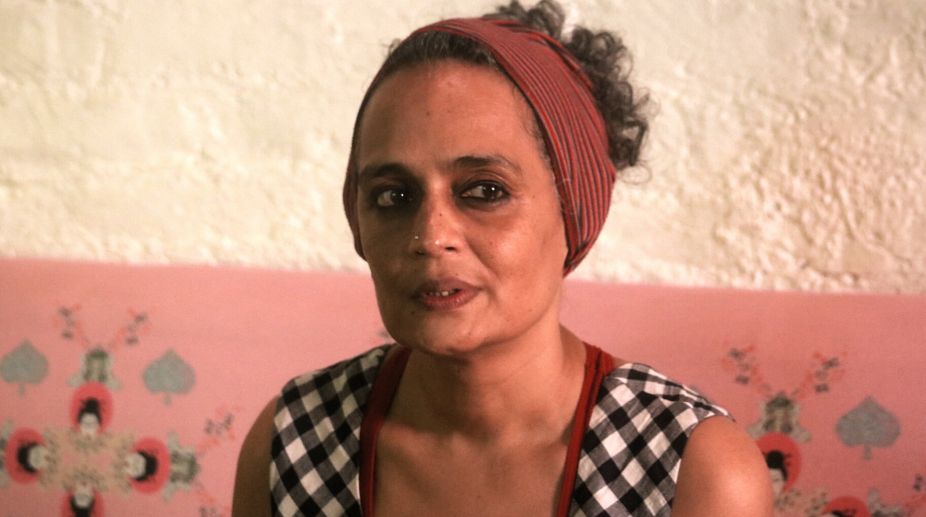Delhi L-G approves prosecution of Arundhati Roy, Sheikh Showkat Hussain
The FIR in the matter was registered on a complaint made by Sushil Pandit on October 28, 2010.

Arundhati Roy (Photo: IANS)
Just when the credentials of Booker winning author Arundhati Roy as a fiction writer were being questioned in literary circles, the acclaimed novelist, after a hiatus of two decades, returned with her second novel and, boom — it is again long-listed for the much-coveted award.
The author, however, feels there’s a world of difference between fiction and non-fiction.
Advertisement
“For me, there is a universe of difference between the two. So when I am writing non-fiction, I am writing usually with a tremendous sense of urgency. I am writing when something is closing down, some Supreme Court order has come or something very, very urgent. And I am writing to intervene. I am writing to argue. I am writing to try and open a space for discourse.
Advertisement
“But when I am writing fiction, I am absolutely without urgency. I have been epicly without urgency. I am trying to construct a universe very carefully, very minutely, and in the case of ‘The Ministry of Utmost Happiness’ I was also experimenting a lot with what fiction can do and how much it can push the walls. So there was absolutely no hurry for me in fiction whereas I have always written non-fiction with a great sense of urgency,” Roy said.
On closer observation, Arundhati Roy’s tryst with writing has been carefully divided between carefree periods spent in writing fiction and the “urgent moments” of writing non-fiction.
Her first novel, “The God of Small Things”, may have introduced her to the literary world but it was not written overnight. After the separation of her parents, Roy spent a large part of her childhood in Kerala, where she came face to face with caste segregation.
There was also an underlying impact of her parents’ divorce on her life.
“My parents were divorced when I was about two years old and so I never knew my father. I had never seen him. It was just an absence, a void. My mother was and is very wonderful, but she was also very harsh; so I left home very early. Now it’s okay, I go back. But in a way, whereas everyone thinks of divorce as a very terrible thing, I don’t necessarily think that way. I think it was better to have a woman asserting her independence and growing into something wonderful like she did, than to live a life of suffering and to transmit that suffering to us. It wasn’t easy, but I don’t think it was a tragedy either,” she recalled.
All of these experiences and personal memories helped shape the larger narrative of “The God of Small Things,” at the centre of which was a broken heart. While it may not be well known, Roy’s first novel too took a couple of years to take its final shape.
But in the period between “The God of Small Things” and “The Ministry of Utmost Happiness”, she engaged in writing several books of non-fiction. These books, like “The End of Imagination,” which she wrote soon after India’s second nuclear test in May 1998, were her responses to urgent issues.
Her return to fiction with “The Ministry of Utmost Happiness” has been the most significant literary event of 2017 so far.
“I started writing it about 10 years ago but I was not in a frame of mind that I have to finish this book by so and so date. In fact, I wanted to live with these people (characters) for a long time to see how we got along together. I think writers are all different, but I am not that interested in writing at a very high speed. However, there is nothing wrong with writing quickly, there are writers who do it brilliantly. But to me it is a very layered universe,” she maintained.
The author also said that just like the nuclear bomb splits the atom, a lot has changed in the past 20 years and as a writer, she has evolved too along the journey.
“I am that much older, I have lived that much longer, I have seen that much more, I have been through so many universes and the world has also changed so much. I think we live in a time when technology has split the moment. It’s like Tilottama (a character from ‘The Ministry of Utmost Happiness’) is sitting there and watching the Jaguar and getting messages about Ghaziabad flats. The most intimate moments are shattered now,” she contended.
In a “world that is connected in a way like it never used to be and at a speed which it never used to be”, Roy, through her latest novel, has attempted to explore how fiction can take this challenge of changing times.
Advertisement